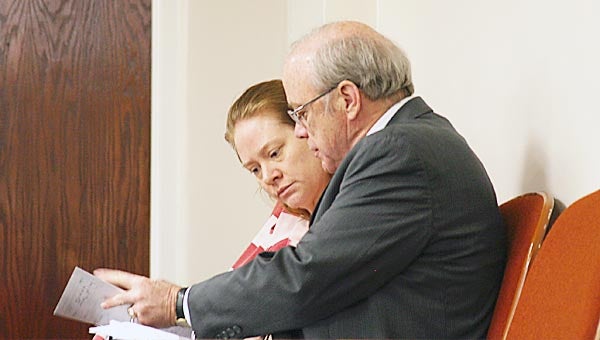Elaborate scheme draws split sentence for former resident who scammed local women’s center
Published 6:53 pm Friday, May 1, 2015

Star Photo/Abby Morris-Frye
Jamie Graves, left, goes over plea agreement documents with her attorney Troy Bowlin before entering her guilty plea in Criminal Court Friday morning. Graves pleaded guilty to stealing the identities of two famous NASCAR drivers as well as a major corporation as part of an elaborate scheme surrounding a local community service agency.
A former Carter County woman pleaded guilty on Friday to stealing the identity of two famous NASCAR drivers and a major corporation as part of an elaborate scheme that defrauded a local community service agency.
She received six months in jail and eight years probation on Friday.
Jamie Renee Graves, 38, of Harvey, La., entered a guilty plea to six counts of identity theft, a Class D felony, and two counts of criminal simulation, a Class E felony.
Under the terms of her plea agreement, Graves faced an effective sentence of 4 years in prison, but Judge Stacy Street granted her request for alternative sentencing during a hearing on Friday following her plea.
Street ordered Graves to serve her time in “split confinement,” which means a portion of her sentence will be served in jail and the remainder on probation. Graves must serve 6 months in jail, after which she will serve 8 years on probation through the Tennessee Department of Corrections.
Graves also requested she be granted judicial diversion, which would allow the conviction to be removed from her record if she successfully completed probation, but Street denied that request.
The charges against Graves stem from 2009 when she contacted Abortion Alternatives and Women’s Center about doing a special event for the center and the children served by its programs.
AA&WC Director Angie Odom testified on Friday that Graves claimed to be friends with NASCAR drivers Darrell Waltrip and his brother Michael Waltrip, and said the two drivers wanted to host an event for the center.
Over a period of months, Odom said Graves outlined plans for a special event to be held in August in the days leading up to the fall race at Bristol Motor Speedway. The event would feature seven NASCAR drivers, a mock race car and food and would be held for the children served by the center’s programs.
“Even though it was not raising money, it was going to make these kids happy and give them a chance to do something like this that they would normally not get to do,” Odom said. “I was so ecstatic.”
As time went by, Odom said the story became more involved. Odom began receiving text messages and e-mails that appeared to be from Darrell Waltrip discussing the upcoming event. Then Odom received an e-mail with a contract agreement between Kimberly-Clark Corporation, the manufacturer of Huggies brand diapers, and Waltrip Racing. In the agreement, Waltrip Racing was going to place a logo for Huggies diapers on Michael Waltrip’s car during the Bristol Race in exchange for Kimberly-Clark Corporation donating a large amount of diapers to the Women’s Center, Odom said.
As the Women’s Center planned for the event, Odom said Graves set up meetings with the Elizabethton Chief of Police to discuss security and met with Elizabethton Housing and Development Agency Director Kelly Geagley and Parks and Recreation Director Mike Mains regarding places to hold the event.
During this same time frame, Graves said she and her family were trying to move back to New Orleans but were having financial difficulties, Odom said. Because Graves was helping to set up this big event for the Women’s Center, Odom said the Center’s Board of Directors decided to pay for a rental truck for Graves and her family to use for their move.
It was shortly after Graves moved that Odom realized the planned event was nothing more than a scam. The Women’s Center was out more than $900 for the cost of renting the moving truck, but the damage done by Graves was greater than the money lost, Odom said.
“No offense, but the $900 is nothing compared to what it did to the children,” Odom said, adding the children had already been told about the event and were very disappointed when she had to tell them they had been lied to by Graves.
After Graves moved to New Orleans, Odom said she talked to her by phone and recorded the conversation, during which she said Graves confessed it was all a scam.
“I asked her why this elaborate story that didn’t do anything for anybody,” Odom said. “Her only answer was ‘I wanted to give you something to look forward to and make you happy.’”
Odom asked the court to deny granting Graves judicial diversion. Prior to working with Graves, Odom said she had done research to try to see if Graves had any criminal past but could not find one. If this conviction were to be removed from Graves’ record, Odom said she feared some other group or agency would fall victim to a similar scam by Graves.
“I need there to be something to show up just to warn others,” Odom said. “This was so elaborate it is impossible this is the first time she has done this. I don’t believe you should be able to walk away from this with nothing on your record.”
During the hearing Graves did not take the stand to testify, but she was allowed to make an statement, or an allocation, before the court. During that statement, a defendant cannot be asked any questions and is not sworn under oath to make the statement.
When Graves stood to speak, she turned to face Odom.
“I am truly sorry for what I have done and for the hurt I have caused you,” she said.
During his review of the case before sentencing, Street said he could not begin to understand the reason behind Graves’ actions but he felt those actions warranted punishment.
“A message needs to be sent that you can’t act like someone you’re not and you can’t pretend to know someone you don’t,” Street said. “She simply had delusions of grandeur that she knew people she did not.”
One of the most troubling aspects of the crime, Street said, was how detailed and elaborate the scheme was and how it hurt so many.
Street noted the probationary sentence would help to monitor Graves’ behavior for any signs of similar schemes.
“During the eight years of probation, at least someone will be keeping an eye on her for that period of time,” he said.





